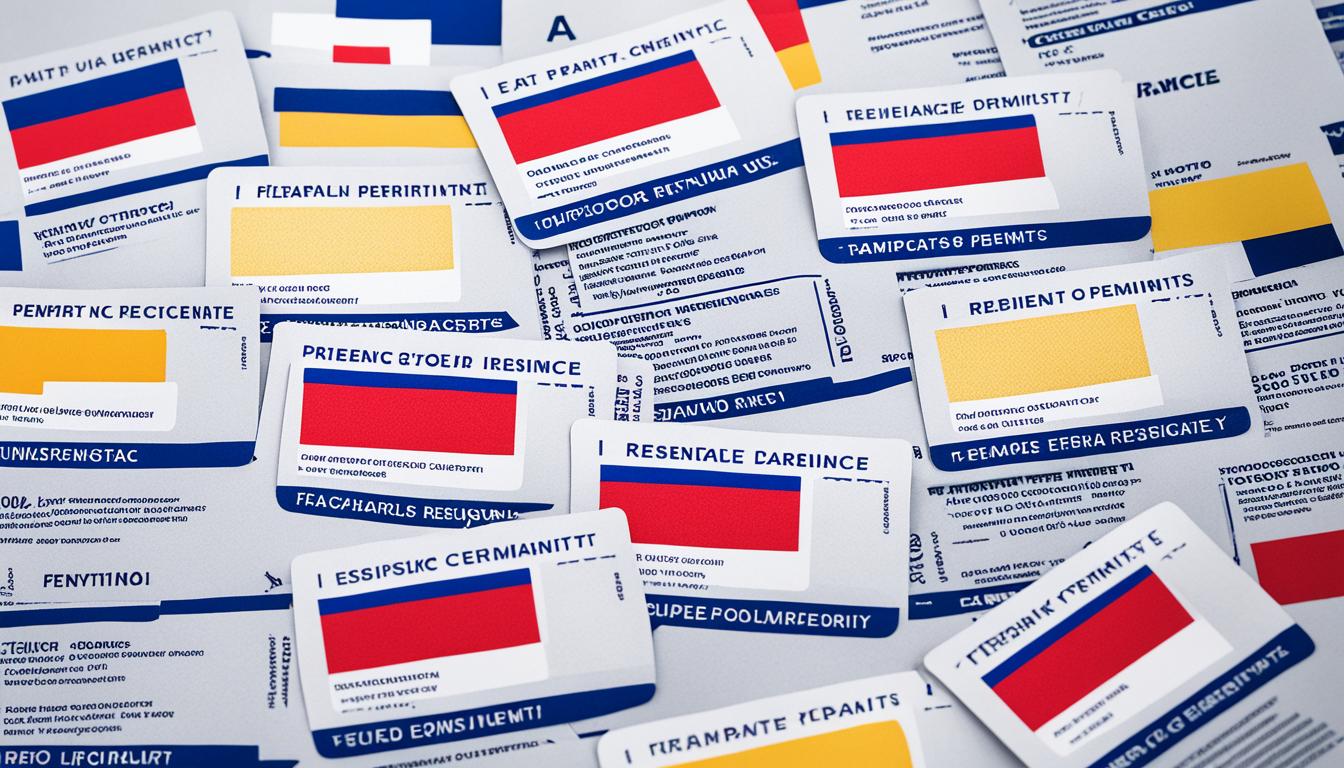
If you’re from Bhutan and want to work in Europe, you’ll need to go through some steps. You must get the right papers like a visa, and follow the laws of the specific European country. It’s crucial to know about immigration, getting a residency permit, and meeting other legal needs to work in Europe.
Key Takeaways:
- To work in Europe, Bhutanese citizens need to get work authorization.
- Getting the right documents and following legal rules is part of the process.
- It’s important to grasp how immigration and residency permits work for European jobs.
- Job chances can be different based on the country and job field you’re in.
- Staying on the right side of the law is key for a smooth work authorization process.
Types of Temporary Residence Permits in France
France allows non-European Union (EU) citizens, like those from Bhutan, to apply for temporary residence permits. These permits, called “Carte de Séjour,” cover different reasons for staying.
Carte de Séjour Étudiant: It’s for students seeking higher education in France. Applicants need an acceptance from a school, proof they can pay for studies, and health insurance.
Carte de Séjour Salarié: For those who have a job offer in France. You’ll need a work contract, qualifications proof, enough money, and health insurance.
Carte de Séjour Vie Privée et Familiale: Family of French citizens or those living there legally are eligible. You’ll need to prove your family relationship and show you can support yourself.
Carte de Séjour Passeport Talent: This one’s for the highly skilled or talented. Requirements depend on your skill or talent and might need proof of your achievements or a job offer.
To apply, you submit documents to the French consulate in your home country or in France itself. They usually want a passport, reasons for staying, where you’ll live, and financial proofs. You might also have an interview and give your fingerprints.
If approved, you can keep studies or working under certain conditions. Having a valid permit means you get benefits like healthcare and education.
| Temporary Residence Permit Type | Eligibility Criteria | Application Process | Required Documents | Renewal and Extension |
|---|---|---|---|---|
| Carte de Séjour Étudiant | Proof of acceptance at a recognized educational institution, proof of financial resources, proof of health insurance coverage | Submit documents to the French consulate/embassy or relevant administrative authority in France | Valid passport, acceptance letter, financial proof, health insurance coverage | Possibility for renewal based on continued enrollment |
| Carte de Séjour Salarié | Valid employment contract, proof of professional qualifications, proof of sufficient income, proof of health insurance coverage | Submit documents to the French consulate/embassy or relevant administrative authority in France | Valid passport, employment contract, professional qualifications, financial proof, health insurance coverage | Possibility for renewal based on continued employment |
| Carte de Séjour Vie Privée et Familiale | Proof of family relationship, proof of sufficient means of subsistence, proof of health insurance coverage | Submit documents to the French consulate/embassy or relevant administrative authority in France | Valid passport, proof of family relationship, financial proof, health insurance coverage | Possibility for renewal based on continued family ties |
| Carte de Séjour Passeport Talent | Proof of exceptional skills or talents, employment offer, or sponsorship | Submit documents to the French consulate/embassy or relevant administrative authority in France | Valid passport, proof of exceptional skills/talents, employment offer/sponsorship, financial proof, health insurance coverage | Possibility for renewal based on continued activities |
Getting a temporary permit in France lets you live and work there legally. It’s key for Bhutanese folks to know the rules, how to apply, and keep their permit up to date.

Schengen Visa Requirements and Application Process
If you’re from Bhutan and want to tour or conduct business in Europe, you’ll need a Schengen visa. This visa lets you travel around several European countries with just one visa. You need to follow certain steps to get this visa. These steps include meeting specific requirements and going through an application process.
Schengen Visa Requirements
To get a Schengen visa, you must meet some important requirements. The requirements can change based on your home country. Make sure to check with the embassy or consulate to get the right information. Some key requirements are:
- A passport that’s valid for six months past your visit’s end date
- Proof you have enough money for your trip and stay
- A plan of your travel showing why you’re visiting and how long you’ll stay
- Details about where you’ll be staying, like hotel reservations
- Travel insurance that meets Schengen standards
You may need more documents, depending on your case and the visit’s purpose. Always contact the embassy or consulate to make sure you have everything you need before applying.
Schengen Visa Application Process
Applying for a Schengen visa involves sending required documents and visiting an embassy or consulate. The process can be different for each country. It’s crucial to look up your country’s specific guidelines before you start.
- Start by filling in the Schengen visa application form correctly.
- Collect all the papers you need, like your passport and extra documents.
- Set a meeting at the embassy or consulate to file your application.
- Go to your meeting and hand in your application in person.
- Pay the visa fee, which changes from country to country.
- Give your fingerprints as part of the visa application.
After you apply, the processing time depends on the embassy or consulate. It’s smart to apply early to cover any processing delays.
Schengen Visa Cost and Timing
The cost of a Schengen visa can differ, based on your destination and the visa type. This fee is not returned, even if your visa gets denied. To know the exact cost, check your local embassy or consulate’s website.
How long the application takes can vary too. For the smoothest process, apply at least three weeks before your trip. Yet, during busy times, it could take longer. So, it’s best to apply as early as you can.
Schengen Insurance
For a Schengen visa, you must have travel insurance that fits Schengen rules. This insurance should cover medical costs, repatriation, and emergency evacuation. Your insurance needs to be valid through the entire Schengen stay.
| Country | Embassy/Consulate | Website |
|---|---|---|
| Germany | Embassy of Germany | www.german-embassy.org |
| France | Embassy of France | www.ambafrance.org |
| Italy | Embassy of Italy | www.ambwashingtondc.esteri.it |
| Spain | Embassy of Spain | www.spain.info |
| Greece | Embassy of Greece | www.mfa.gr |
Introduction to ETIAS – European Travel Information and Authorisation System
By 2025, the European Commission will launch the ETIAS for those from visa-free countries. This includes nations within the EU and Schengen zone. It’s a big step for safety and to make travel easier for everyone.
ETIAS isn’t a visa, but it’s needed for citizens of countries that don’t require a visa to enter Europe. It involves security checks and a small fee. This process aims to make sure those who are allowed in have been properly screened. It’s all about keeping everyone safe.
Applying for ETIAS is simple and quick. You’ll need to fill out an online form with your personal and passport details. Your answers will be looked at to see if you can get the travel approval. Normally, it takes just a few minutes but can be longer in some cases.
If your ETIAS is approved, it gets connected to your passport online. You can use it for three years or until your passport expires. This means you can travel to the Schengen area multiple times during this period.
When you’re about to travel to the EU, your ETIAS will be checked. When you reach your destination, they might check it again. Having an approved ETIAS is good but it doesn’t guarantee you will enter. Final entry decisions are made by border officials.
The fee for ETIAS is pretty reasonable and won’t break the bank. When you apply, you’ll pay a yet-to-be-announced fee online. This money goes to process your application and the security checks.
Remember, your ETIAS can be canceled if something goes wrong during or after the application. So stick to the rules and give accurate info to avoid travel problems later on.

ETIAS – Impact on Travel Plans and Eligibility
In 2025, the launch of ETIAS will change things for many travelers to EU countries. This includes citizens from Bhutan who enjoy visa-free travel now. They will soon need an ETIAS to visit Europe.
ETIAS eligibility is based on your citizenship, where in the EU you’re going, and your visit’s purpose and duration. Bhutanese citizens must check if they need a Schengen visa or ETIAS for their 2025 travel.
Thinking of a European trip? Bhutanese citizens should look at their ETIAS eligibility. They must know where exactly in the EU they’re headed. Also, the reason and length of the visit affect the needed documents.
Impact on Travel Plans
With ETIAS, Bhutanese travelers will tackle a new step: getting an ETIAS before their journey. The application asks for personal details, passport info, and background info.
ETIAS means more prep for Bhutanese visitors. They should plan for extra time and possibly money for this authorization. Remember the ETIAS start date for upcoming Europe trips.
Eligibility for ETIAS
Your citizenship decides if you need ETIAS. For Bhutanese citizens visiting the EU, they must get ETIAS. They’ll look at your visit’s purpose and how long you’ll stay.
To travel smoothly, Bhutanese visitors must know if they qualify for ETIAS. They should check requirements based on their reasons for visiting and time spent in the EU. This makes sure they have all they need and follow ETIAS rules.
For Bhutanese visitors, knowing about ETIAS is key for a Europe trip after 2025. Aware of new rules, they can plan well for a great journey. Plan whether for a Schengen visa or an ETIAS. Early planning helps them adjust and enjoy their European visits.
Conclusion
Navigating work authorization for Bhutanese citizens in Europe needs understanding of each country’s rules. This includes getting a temporary residence permit in France, a Schengen visa, or preparing for ETIAS. Knowing the needed documents, when to apply, and legal rules is key to a smooth process.
In France, getting a temporary residence permit means looking at permits like “Carte de Séjour Étudiant” or “Carte de Séjour Salarié”. Each one is for students or employees and has its own rules and benefits.
For a Schengen visa, it’s important to know what your country requires. You must collect documents like a valid passport and proof of your money situation. Also, think about the timing and costs of applying.
Soon, in 2025, there will be a new system for entering Europe called ETIAS. Bhutanese citizens must know about it. ETIAS will check your security and you must pay a fee. Visitors have to give some personal information and answer some security questions.
